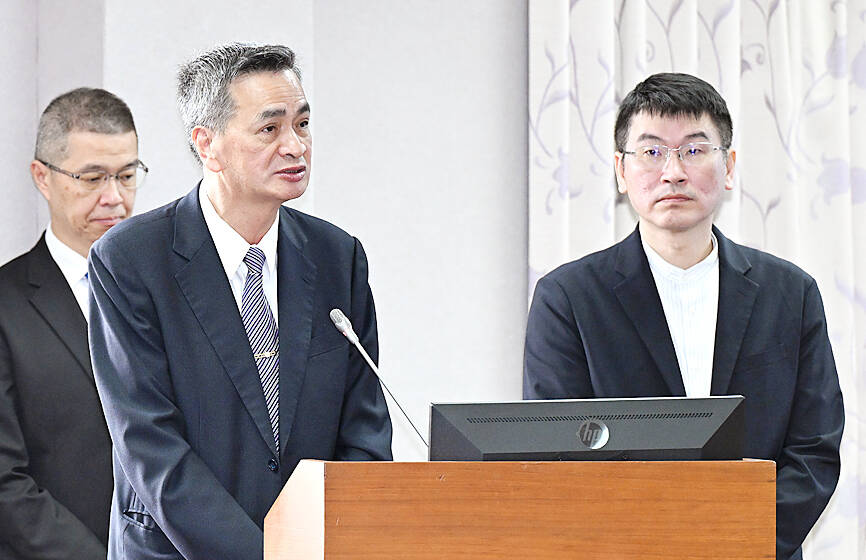More than 10,000 naturalized Taiwanese citizens from China did not provide proof that they renounced their Chinese citizenship as the law stipulates, the National Immigration Agency (NIA) told lawmakers yesterday.
NIA officials made the remarks a day after the agency said in a news release that a minority of Chinese-born naturalized citizens had received warnings over their failure to submit documentation proving that they do not have dual citizenship.
Democratic Progressive Party (DPP) Legislator Chuang Jui-hsiung (莊瑞雄) during a legislative session asked whether government actions had been motivated by the deportation of three Chinese-born influencers over the past few weeks who made public statements supporting China using force to invade Taiwan.

Photo: Liao Cheng-hui, Taipei Times
He also asked officials the number of Chinese immigrants holding citizenship in Taiwan who might be in breach of the ban on dual citizenship stipulated by the Act Governing Relations Between the People of the Taiwan Area and the Mainland Area (臺灣地區與大陸地區人民關係條例).
The NIA has no political motive for the notices, as officials have been serving them to naturalized citizens not in compliance with the law since before the controversy regarding the three influencers, NIA Deputy Director-General Chen Chen-cheng (陳建成) said.
In 2004, Taiwan promulgated amendments to the law that require naturalized citizens born in China to legally renounce their Chinese citizenship, Chen said.
The number of Chinese immigrants not in compliance with the amendments is a minority compared with the total number of 140,000, he said, adding that the NIA revoked the citizenship of 676 Chinese immigrants.
Most immigrants in breach of that law failed to provide documentation due to paperwork issues or health problems related to the COVID-19 pandemic, he said.
The amendments apply to people who obtained citizenship via marriage before 2004, Mainland Affairs Council (MAC) Deputy Minister Liang Wen-chieh (梁文傑) said.
The MAC has received complaints from Chinese spouses, including reasonable ones that officials are helping to resolve, he said.
Separately, DPP caucus chief executive Rosalia Wu (吳思瑤) said party lawmakers support government actions insofar as they follow the law.
Practical difficulties in the law’s implementation should be negotiated, she said.
DPP Legislator Huang Jie (黃捷) cited the act as saying that Chinese nationals who obtained Taiwanese citizenship should have renounced their citizenship and household registration in China within six months of the law’s promulgation.
The authorities should protect the lawful rights of immigrants who had lost their documents or could not realistically be expected to return to China to obtain their papers, she said.
Chinese Nationalist Party (KMT) caucus whip Fu Kun-chi (傅?萁) said enforcing immigration offenses that might have been committed 20 years ago past their statute of limitations is a violation of human rights.
The government should work on dealing with a looming global economic depression, not finding domestic enemies, he added.

The combined effect of the monsoon, the outer rim of Typhoon Fengshen and a low-pressure system is expected to bring significant rainfall this week to various parts of the nation, the Central Weather Administration (CWA) said. The heaviest rain is expected to occur today and tomorrow, with torrential rain expected in Keelung’s north coast, Yilan and the mountainous regions of Taipei and New Taipei City, the CWA said. Rivers could rise rapidly, and residents should stay away from riverbanks and avoid going to the mountains or engaging in water activities, it said. Scattered showers are expected today in central and

COOPERATION: Taiwan is aligning closely with US strategic objectives on various matters, including China’s rare earths restrictions, the Ministry of Foreign Affairs said Taiwan could deal with China’s tightened export controls on rare earth metals by turning to “urban mining,” a researcher said yesterday. Rare earth metals, which are used in semiconductors and other electronic components, could be recovered from industrial or electronic waste to reduce reliance on imports, National Cheng Kung University Department of Resources Engineering professor Lee Cheng-han (李政翰) said. Despite their name, rare earth elements are not actually rare — their abundance in the Earth’s crust is relatively high, but they are dispersed, making extraction and refining energy-intensive and environmentally damaging, he said, adding that many countries have opted to

SUPPLY CHAIN: Taiwan’s advantages in the drone industry include rapid production capacity that is independent of Chinese-made parts, the economic ministry said The Executive Yuan yesterday approved plans to invest NT$44.2 billion (US$1.44 billion) into domestic production of uncrewed aerial vehicles over the next six years, bringing Taiwan’s output value to more than NT$40 billion by 2030 and making the nation Asia’s democratic hub for the drone supply chain. The proposed budget has NT$33.8 billion in new allocations and NT$10.43 billion in existing funds, the Ministry of Economic Affairs said. Under the new development program, the public sector would purchase nearly 100,000 drones, of which 50,898 would be for civil and government use, while 48,750 would be for national defense, it said. The Ministry of

UNITED: The other candidates congratulated Cheng on her win, saying they hoped the new chair could bring the party to victory in the elections next year and in 2028 Former Chinese Nationalist Party (KMT) lawmaker Cheng Li-wun (鄭麗文) yesterday won the party’s chair election with 65,122 votes, or 50.15 percent of the votes. It was the first time Cheng, 55, ran for the top KMT post, and she is the second woman to hold the post of chair, following Hung Hsiu-chu (洪秀柱), who served from 2016 to 2017. Cheng is to succeed incumbent Eric Chu (朱立倫) on Nov. 1 for a four-year term. Cheng said she has spoken with the other five candidates and pledged to maintain party unity, adding that the party would aim to win the elections next year and